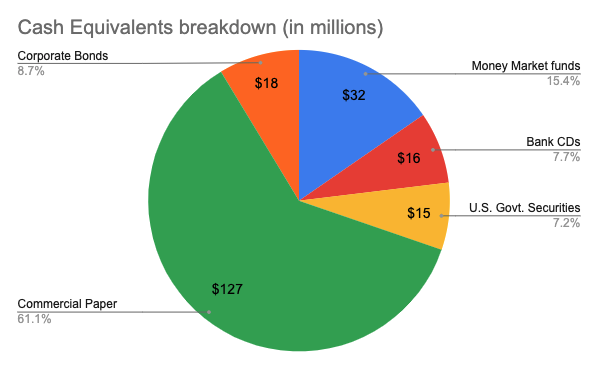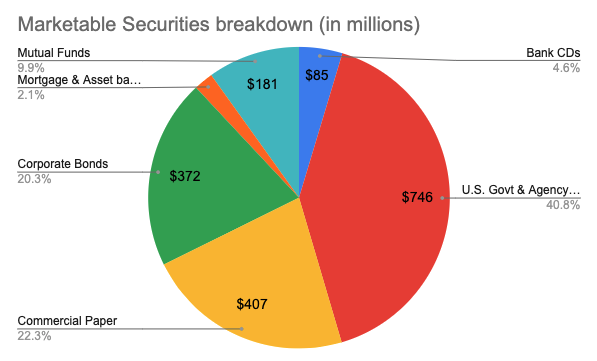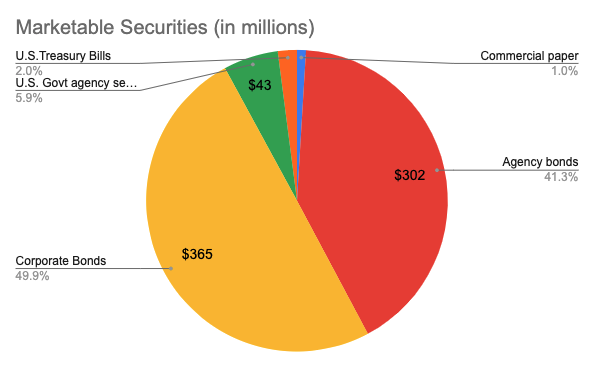Airbnb, DoorDash & Zoom - Analyzing their corporate cash portfolios

We have had a flurry of market activity this month along with the announcement of the most anticipated IPOs of year - Airbnb & DoorDash. We wanted to take this opportunity to analyze the corporate cash portfolios of these iconic companies while the news was fresh off the press!
Zoom, Airbnb & DoorDash are very different companies, but you will see that a lot of the strategies they use to manage their corporate cash and keep it safe, liquid and earning a reasonable rate of return are quite similar.
Airbnb
Let’s start with Airbnb, who has been rumored to be one of the most sophisticated at managing their corporate portfolio. VentureBeat had an article on it a few years ago that you can read here. Their S-1 filing this week gives us a more detailed picture of what they're doing with their cash. All of this data is from their most recent S-1 filing with the SEC and as of September 30, 2020.
Total Cash, Cash Equivalents & Marketable Securities = ~$4.5B

*Cash Equivalents consist of money market funds, Bank Certificates of Deposit, U.S. Government Debt Securities, Commercial Paper & Corporate debt securities with original maturities of less than 3 months.
For those of you interested in their historical positioning you can check out the details here.
Now let’s look at a breakdown of their cash equivalents and marketable securities.
Cash Equivalents = $208M

You can see they are being very aggressive with their positioning in corporate debt rather than in U.S. Government securities. This is likely because they are carrying over $2B in operating cash in their various banking relationships across the world. The highly transactional nature of their business means that they essentially run an internal payments company as well. However, they could probably tweak that and hold more cash in short term U.S. Treasury securities rather than in bank accounts.
Marketable Securities = $1.8B

In their marketable security portfolio you can see the aggressive bent as well, with only 40% of assets in government securities. The rest are in corporate bonds, with the most interesting being a nearly 10% position in mutual funds. One can only speculate as to which funds these are, but our guess is that these are closed end fixed income funds that give them a above market yield on their capital.
This positioning of their cash portfolio has allowed them to earn over $23M in interest income in the first 9 months ended September 30, 2020. That’s enough to spend $100k/year on Airbnbs for the next 230 years, or a pretty penny!
For those of you geeky folks that want to look into the innards of their treasury portfolio and how they have managed it over the past few years just reach out to us!
DoorDash
Pre-IPO, DoorDash has a cash hoard of ~$1.6B, and it’s sure to swell after a successful offering in the near future. Let’s take a look at how the savviest food delivery business manages their corporate cash.
All of this data is as of Sept 30, 2020 from their most recent S-1 filed with the SEC.
Total Cash, Cash Equivalents & Marketable Securities = ~$1.6B

*Cash and Cash Equivalents consist of bank deposits, money market funds & short term securities with maturities of less than 3 months at purchase.
Now, let’s take a look at their marketable securities portfolio which accounts for about 1/3rd of their liquid assets.
Marketable Securities = ~$515M

As we can see, DoorDash is following a very conservative strategy that gives them maximum safety and flexibility with their cash. They are not yet profitable (like Zoom) so they sensibly focus on liquidity of their capital rather than trying to maximize their interest income.
Even then they were able to earn ~$6M in interest income for the 9 months ended September 30, 2020. That’s over 700k Big Mac meal orders from DoorDash!
We don’t know the internal day-to-day cash requirements of their business, but we would recommend that they keep a larger chunk of their cash in U.S. Treasury Bills rather than bank deposits to maximize safety.
Zoom
Zoom IPO’d last year as one of the few “profitable” tech companies, and has seen incredible growth through COVID-19 as everyone has been forced to move online and into the virtual world.
Given this, let’s see what a fast growing company like Zoom does with their ~$1.5B cash on hand.
All of this data is from their 2nd quarterly filing as of July 31, 2020 (source: 10-Q)
Total Cash, Cash Equivalents & Marketable Securities = ~$1.5B

“Cash and cash equivalents consist of bank deposits, money market funds, high-grade commercial paper, and agency bonds with maturities of less than 3 months at issue. Our marketable securities generally consist of high-grade commercial paper, agency bonds, corporate and other debt securities, U.S. government agency securities, and treasury bills. The cash and cash equivalents and marketable securities are held for working capital purposes.
The primary objective of our investment activities is to preserve principal while maximizing income without significantly increasing risk.” (source: Zoom 10-Q)
Now let’s deep dive into their portfolio of “marketable securities” which accounts for about 50% of their liquid funds that are held for working capital purposes.
Marketable Securities = ~$732M

Additionally, ~$400M of these securities have maturities of less than 1 year, and the remaining ~$332M have maturities of between 1 to 5 years.

This type of strategy allows Zoom to be flexible with their cash. The short maturities help them stay liquid, and apportioning some cash to longer dated securities allows them to pick up additional yield on their capital.
They have earned over $2M in interest just in Q2, and a total of almost $8M in Q1 & Q2. Not too shabby! That is equivalent to almost 40k yearly Zoom enterprise licenses!
(source: https://zoom.us/pricing and 10-Q)
A key point to note is that they own these securities outright, and do not use funds, ETFs or other such synthetic instruments. Doing this allows them to control their capital, reduce risk and customize their investments to suit their specific needs.
By leveraging our services at InterPrime you too can take advantage of the capital markets with your cash, in the way Zoom does. We can help you create a system that works for your specific needs while keeping your cash safe, liquid and earning a reasonable return.
Reach out to learn more!
Further reading:
SIPS by InterPrime - Standard Investment Policy for Startups
Cash Management for Startups - Don’t blow your VCs Money!
Setting up your Corporate Banking & Treasury Strategy

